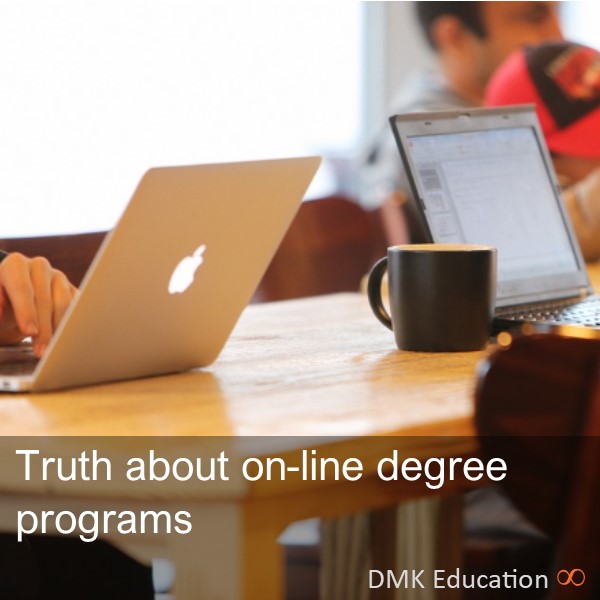Online degrees have come a long way over the last 10 years. In addition to numerous online universities - most community colleges, state schools and private universities now offer online degree programs, online courses or blended learning.
This allows most working adults the option to study from home for most or all of their college education.
But what are the drawbacks versus the benefits of this type of education?
Benefits of online education
- Convenience - The opportunity to learn outside the classroom allows you to keep your full-time job and complete your coursework anytime of day or night. You don't need to drive to and from college for various classes that can be scattered throughout the day. You will save time and money; who doesn't need more of that?
- Independent learning - Learning your own way with a supportive lesson plan will provide many adults the ability to achieve success without personality conflicts of professors or "micro educational instruction".
- Acceptance of online degrees - The stigma of an online degree is quickly being dissolved since the acceptance of online education is evident in the amount of programs offered by reputable educators around the world. This is likely in response to student demand as online-only educators have increased enrollment significantly over the last 15 years. Furthermore, employers rarely require details relevant to specific coursework within a degree obtained online, in classroom or through a hybrid program. Most employers who have had new hires volunteer this information, indicate they generally hire employees regardless if they have online college coursework or degrees.
- Financial assistance - While the costs for an online education may be higher, it will not impact your ability to obtain financial assistance by way of grants, scholarships or student loans as long as you, your degree program and classes meet the qualifications specified by the financial assistance provider. You will still qualify for the maximum amount, but there may be an excess amount due if the online cost supersedes the offered financial aid. Most financial assistance providers will approve online degree programs from accredited institutions. Before enrolling in any program or educational institution you should meet with the financial aid advisor to understand the opportunity for financial assistance as it applies to the program of interest. For more information related to financial assistance opportunities please visit: https://student aid.ed.gov for assistance with government backed loans, grants and work-study programs.
Draw-backs of online education
- Limited courses or degrees available - While most educators provide options for online courses or degree programs, they may not offer the specific course or program for which you have an interest.
- Cost - Many educators and online universities cost approximately 25% more for online degree programs.
- Less instruction - Independent study is popular but can present issues when the coursework is beyond the scope of the student's comprehension. As the program progresses into more complicated coursework, more classroom instruction may be necessary. A blended learning opportunity (hybrid courses that include some classroom time and some online coursework) may be worth considering.
- Accreditation - There are still numerous online programs that are not accredited at the regional or national level. This can be an expensive and time consuming lesson to learn. You should always make sure your educator is an accredited institution to ensure it meets standard education guidelines as determined by a third party evaluator. Many employers will only consider your qualifications of education are met when obtained by an accredited institution.
- Marketing - Watch out for slick marketing or fast talking admissions counselors who tell you it’s not necessary to earn a degree from an accredited school. Instead visit the U.S. Department of Education for a list of accredited schools and more details related to accreditation.
Disclaimer
The information provided by respective owner's ("we", "us" or "our) on Divorce Me Knot (referenced also as "DivorceMeKnot.com", "dmk", "DMK", "OurDMK.com", "OurDMK", "application" or "site") is for general informational purposes only and is subject to change with or without notice. All information on our site and application is provided in good faith, however we make no representation, guarantee or warranty of any kind, express or implied, regarding the accuracy, validity, adequacy, reliability, availability or completeness of any information on the site or application.
The information in articles and all content on this site should not be considered psychological or behavioral health therapy, counseling or legal, financial, real estate, mortgage, insurance or professional advice. It should not be used in place of professional advice from a counselor, therapist, physician, behavioral health professional, legal, real estate, mortgage, insurance, financial advisor or other licensed professional or credentialed expert in related subject matters. Providers of content on this site, herein known as "Contributors" (inclusive of, but not limited to writers, bloggers, editors, employees, developers, graphic designers, advertisers, partners, affiliates, references, experts, professionals and site owners) are not legally liable for any misinformation, errors or omissions.
Under no circumstances should DMK and/or it's Contributors have any liability to users of the site for any loss or damage incurred to users as a result of the use of this site or application or reliance of any information provided on the site or application. Use of the site or application and reliance on any information from the site or application is solely at the user's own risk.
For complete site disclaimers review "Disclaimers" on this site or click the link below.












 How to resolve AdBlock issue?
How to resolve AdBlock issue?